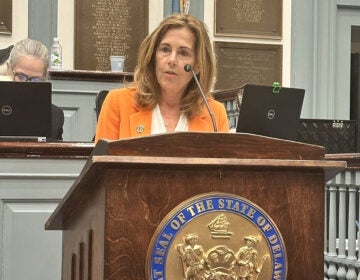$2.1M in gold bars: Delaware woman among victims fleeced in fraud scam targeting older adults
The criminals posed as federal agents and told victims they were being investigated. A New York man has pleaded guilty in the ongoing investigation.

Employees of Pro Aurum gold house presents 1 Kg gold bars of 999.9 purity in the safe deposit boxes room in Munich, Germany, Friday, April 25, 2025. (AP Photo/Matthias Schrader)
From Philly and the Pa. suburbs to South Jersey and Delaware, what would you like WHYY News to cover? Let us know!
When an older, affluent resident of southern Delaware answered her phone one day in August 2023, the caller identified himself as a federal drug agent.
He had frightening news.
The woman’s identity had been stolen and was now associated with suspicious activity, so she was being investigated. The good news was that she could avoid criminal charges if she cooperated.
The price of her freedom?
Bars of gold.
The U.S. Department of the Treasury would hold the bars for safekeeping, the woman was told, and she’d eventually get the money back.
Fearing the consequences, she went to her bank, withdrew gobs of cash and followed instructions.
On three separate occasions over the next several months, men who said they were federal officers drove to her home in the rural Sussex County town of Millsboro and picked up the gold bars.
Their total value was $701,529.
By February 2024, she was not only out of a fortune, her name hadn’t been cleared. So the woman called state police, and reported she might have been scammed.
State and federal authorities began investigating, even as the men who sought and took the gold bars continued pestering her to give them even more, according to court records and accounts of Delaware and federal law enforcement officials.
That April, one of the men told her to convert another $300,000 from her bank and buy about 4 kilograms, or 8.8 pounds, with the cash.
Suspect searched online for ‘gold price kg’ and ‘gold price today’
This time the cops were watching.
Detectives began tracking the people who had taken the woman’s money by monitoring their messaging apps, social media accounts and through other means they did not detail. They found that calls to the woman were from a number that appeared to be in the United States, but actually had originated in India.
The authorities saw that one man — Rakeshkumar Patel, an Indian national in his mid-30s who lived in Flushing, New York, but was in the United States illegally — had repeatedly used his cell phone to search online for “gold price kg” and “gold price today.”
And on May 17, 2024, Patel had used the WhatsApp message service to ask another man whether the “4kg” — 4 kilograms of gold — had arrived yet.
Three days later, Patel rented a white Toyota RAV4 in New York, and drove more than 225 miles from his home in the borough of Queens to the woman’s home in southern Delaware.
Patel stopped briefly in front of the house, then drove off and parked about a mile away. Soon, someone else called the woman and said the federal agent would be there in a little while to pick up the 4 kilograms of gold.
When the agent arrived, she was told, he’d say the code word, which was “David.”
At 4:35 p.m., one man using the WhatsApp service messaged Patel to “Go.” The message originated in India, authorities said.
A few minutes later, Patel returned to the woman’s house, and an undercover cop pretending to be the woman walked to the passenger side of Patel’s rented RAV4. She carried what appeared to be gold bars, but were fakes.
Patel said the code word “David,” then repeated it. The woman put the bars inside the vehicle, and Patel drove away.
He didn’t get far before police pulled him over and took him into custody.
Patel was charged with theft over $100,000 and with wearing a disguise while committing a felony, according to police. The disguise was not identified by police or in court papers.
Patel was sent to the Sussex Correctional Institution in lieu of $103,000 cash bond while the feds took over the investigation of him and others who have not yet been named.
Their probe culminated last month, when federal prosecutors charged Patel with conspiracy to commit wire fraud through an elaborate fraud scam targeting older adults and spanning four states.
Not only are Patel and his unidentified “co-conspirators” accused of swindling the Delaware woman out of $701,529, they’re also charged with ripping off two people in Nebraska for a total of about $1.06 million, one in North Carolina for $248,360 and one in Florida for $150,000, court records show.
The charging document was a so-called criminal “information,’’ which traditionally precedes a guilty plea. That’s exactly what Patel did May 21 in U.S. District Court in Wilmington, where he agreed to repay $2,154,889 to the people he and others had fleeced.
Patel faces from five to 20 years behind bars, and could also be fined up to twice the amount of the theft.
John Malik, Patel’s attorney, had no comment.
Prosecutors would not agree to be interviewed about the case because “the investigation is ongoing,” said Kim Reeves, spokeswoman for the U.S. Attorney’s Office in Wilmington.
But in written statements issued after Patel’s guilty plea, federal authorities condemned scams targeting older adults and praised the U.S. Department of Justice’s Elder Justice Initiative. The FBI estimates that such scams cost older adults $3 billion a year.
The goal is “protecting elderly victims from being swindled out of their hard-earned life savings by bad actors like Patel,” said Shannon T. Hanson, acting U.S. attorney for Delaware. “We encourage all members of the public to remain vigilant against these scams. If you think you or a loved one may have been defrauded, make a report to law enforcement immediately.”
Bill DelBagno, who heads the FBI’s office in Baltimore and oversees the Wilmington office, said that when agents “talk to victims, you see and hear how gut wrenching and devastating these scams are. They’re often facing deep financial anxiety and are emotionally distressed, with the aftereffects weighing heavy on all aspects of their lives.”
Authorities urge anyone who knows someone 60 or older who has been the victim of financial crime to contact the National Elder Fraud Hotline at 1-833-372-8311, local police or the FBI’s Internet Crime Complaint Center at ic3.gov.

Get daily updates from WHYY News!
WHYY is your source for fact-based, in-depth journalism and information. As a nonprofit organization, we rely on financial support from readers like you. Please give today.







